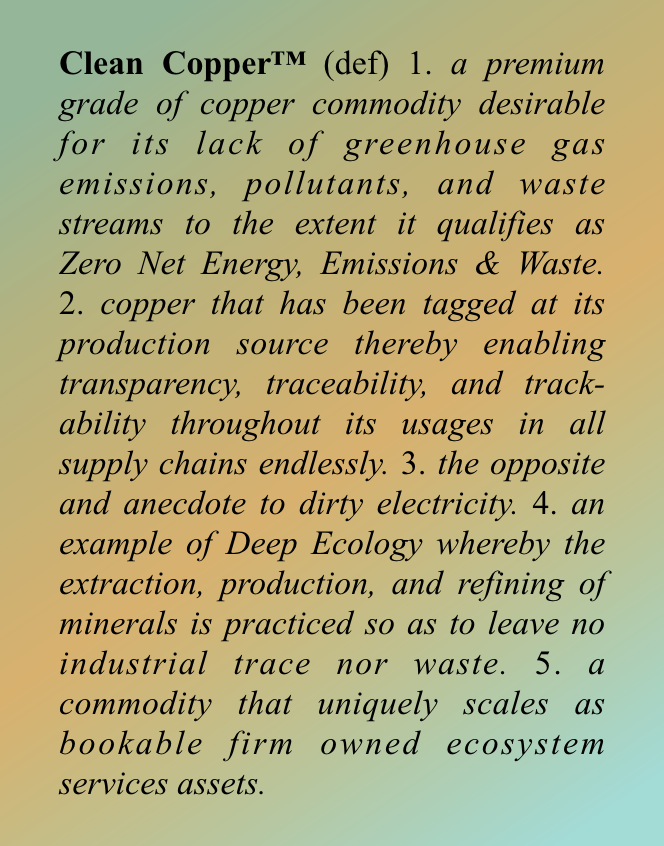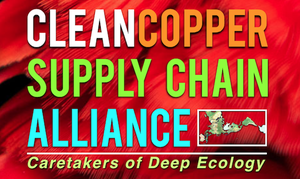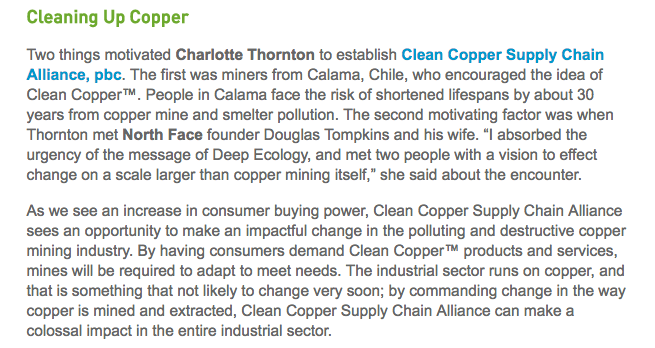Clean Copper Supply Chain Alliance, pbc
Semi-Finalist
SB INNOVATION OPEN 2016
Semi-Finalist
SB INNOVATION OPEN 2016
"Preventing these (tailing dam) failures is critical to protecting the public from environmental and financial impacts, since there is no financial surety
for catastrophic tailings dam accidents."
Dr. David Chambers, President
The Center for Science in Public Participation
for catastrophic tailings dam accidents."
Dr. David Chambers, President
The Center for Science in Public Participation
|
The accident, which took place on January 25, killed over 100 people and forced dozens out of their homes. Rescue teams say that about 260 people have been reported missing.
|
Vale's COrrego de FeijAo tailings dam collapse |
The death toll from Vale’s Córrego de Feijão tailings dam collapse neared 100 on Thursday, and the consequences are piling up.
Dead, missing and rescued: As of Thursday, Vale had reported 99 fatalities, 259 missing and 192 rescued. Vale has vowed to compensate the families of the victims with 100,000 reis (about $36,000) each but, as Reuters reported, that promise has not been well received
From the CEO: “I am completely torn apart by what has happened,” Vale CEO Fabio Schvartsman said on Sunday at a Rio de Janeiro press conference.
Production cuts: The company is temporarily closing some of its Brazilian operations, cutting its iron ore production in Brazil by 40 million tonnes annually, as part of its plan to decommission its 10 upstream tailings dams in the country. Vale will invest 5 billion reis (about $1.8 billion) in the decommissioning process. The iron ore spot price has spiked as a result, currently sitting around US$85 per tonne. CRU Group director Paul Robinson said in a CRU-Fitch Ratings webcast on Friday morning that the open question is what level and grade of replacement production Vale is able to achieve at its other operations, and whether other iron ore operators like Rio Tinto can increase their own production levels.
Arrests and lawsuits: Brazilian authorities issued five arrest warrants on Tuesday for three Vale employees and two contractors. The company said in a statement it was “fully cooperating” with the authorities. Brazil’s Ministry of Labour has filed a public civil action against the company and been granted a preliminary injunction that involved freezing 1.6 billion reis (about $0.6 billion) from Vale’s bank account. In the United States, a securities class action was filed against Vale, CEO Schvartsman and CFO Luciano Siani Pires, alleging the company made “false and misleading statements” and failed to disclose the risk of a dam breach at Córrego de Feijão and what the potential damage could be. “Vale intends to defend vigorously against the claims,” the company said.
Penalties and investigations: Vale has been hit by an ongoing string of court-mandated asset holds, including by the Minas Gerais state labour court and judges in Belo Horizonte and Brumadinho. The company has also been fined by Brazil’s federal environment institute, Ibama, and by the state of Minas Gerais. The country’s securities and exchange commission is investigating whether the company released information related to the dam burst as quickly as it should have. UN human rights experts have called for an investigation into the collapse.
*****
Dead, missing and rescued: As of Thursday, Vale had reported 99 fatalities, 259 missing and 192 rescued. Vale has vowed to compensate the families of the victims with 100,000 reis (about $36,000) each but, as Reuters reported, that promise has not been well received
From the CEO: “I am completely torn apart by what has happened,” Vale CEO Fabio Schvartsman said on Sunday at a Rio de Janeiro press conference.
Production cuts: The company is temporarily closing some of its Brazilian operations, cutting its iron ore production in Brazil by 40 million tonnes annually, as part of its plan to decommission its 10 upstream tailings dams in the country. Vale will invest 5 billion reis (about $1.8 billion) in the decommissioning process. The iron ore spot price has spiked as a result, currently sitting around US$85 per tonne. CRU Group director Paul Robinson said in a CRU-Fitch Ratings webcast on Friday morning that the open question is what level and grade of replacement production Vale is able to achieve at its other operations, and whether other iron ore operators like Rio Tinto can increase their own production levels.
Arrests and lawsuits: Brazilian authorities issued five arrest warrants on Tuesday for three Vale employees and two contractors. The company said in a statement it was “fully cooperating” with the authorities. Brazil’s Ministry of Labour has filed a public civil action against the company and been granted a preliminary injunction that involved freezing 1.6 billion reis (about $0.6 billion) from Vale’s bank account. In the United States, a securities class action was filed against Vale, CEO Schvartsman and CFO Luciano Siani Pires, alleging the company made “false and misleading statements” and failed to disclose the risk of a dam breach at Córrego de Feijão and what the potential damage could be. “Vale intends to defend vigorously against the claims,” the company said.
Penalties and investigations: Vale has been hit by an ongoing string of court-mandated asset holds, including by the Minas Gerais state labour court and judges in Belo Horizonte and Brumadinho. The company has also been fined by Brazil’s federal environment institute, Ibama, and by the state of Minas Gerais. The country’s securities and exchange commission is investigating whether the company released information related to the dam burst as quickly as it should have. UN human rights experts have called for an investigation into the collapse.
*****
Hundreds still missing following Vale's dam break in Brazil
|
|

Mining sector unloved as investors find it hard to trust
Reuters | Feb. 16, 2018, 5:00 AM |
Reuters | Feb. 16, 2018, 5:00 AM |
BHP faces shareholder class action over Brazil mine disaster Law firm alleges BHP knew the dam was at imminent risk of breaking but did not tell markets, in breach of regulations. |
|
Norway reconsiders its mining investments
Ana Komnenic | 50 months ago
Norway, the country that owes much of its wealth to oil, is reconsidering its investments in the mining industry due to environmental concerns. Throu …
Get Involved! We are creating the Easy Button for all suppliers and consumers
to leapfrog the last century of copper mining´s paradigm.
To not do so now is an Rx for disaster.
to leapfrog the last century of copper mining´s paradigm.
To not do so now is an Rx for disaster.
German researchers say mining intensifies social conflicts in Peru |
|
A group of researchers from Berlin’s Humboldt University published a study where they say that mining activities are the leading cause of social conflicts in Peru.
According to the study, which is titled “Alternatives for the development of Peru’s mining regions,” one of the reasons that explains the unrest is the fact that the country’s economic policies do not allow for a large royalty collection from resource extraction and, therefore, there are few opportunities to reinvest those funds in mining cities and towns. On top of that, the experts say that the fall in commodity prices in the past years has worsened the situation. Interviewed by Deutsche Welle, the mining and development advisor for the German episcopal organization Misereor, Susanne Pries, said that for the past 20 years most community groups in the South American country have been complaining about mining activities polluting their environment, poisoning them, displacing people and intensifying poverty. Together with local NGO Red Muqui, Misereor’s team visited the northwestern |
Cajamarca region and, while observing the expansion project of a gold mine, they witnessed how the town of 130,000 people is competing with companies for water resources. This creates environmental conflicts that even though are balanced out by the regional government’s stand on regulating mining operations, are always present due to the antagonistic position of the federal government.
The experts expressed concerns over the fact that some firms are mining up to 660 metres deep, where the water table falls, and thus entire towns run out of water. In the central Junin region, on the other hand, they noticed how half of the residents make a living by working in the mining industry while the other half do so in agriculture. The two worlds, they write, also tend to collide because everyone wants to have access to the Mantaro river, which is one of the tributaries of the Amazon river. The German-Peruvian report states that if this situation is allowed to continue, the environmental consequences may go beyond the |
country’s borders and might affect the continent's freshwater reserves. The authors criticize the fact that the National Service of Agrarian Health, which is supposed to inspect and regulate mining operations, is led by someone with deep connections in the mining industry.
Peru is the world’s No.2 copper producer and the sixth largest producer of gold. |
Ecuador’s rising opposition to mining may thwart exploration boom
Cecilia Jamasmie | Jan. 6, 2019, 6:50 AM |
|
In two landmark cases last year, local courts sided with rural and indigenous communities who argued Ecuador's government had failed to inform them it was setting aside parts of their territories for mineral exploitation.
Ecuador, one of the hottest destinations for copper prospectors, aims to more than double the value of mining to its economy by 2021, but projects risks delays and potential halts due to growing local opposition to the extraction of the country’s resources.
|
According to the latest report by Fitch Solutions Macro Research, the ongoing expansion of mining exploration in the South American country is raising the risk of tensions between companies and the local population.
In two landmark cases last year, Ecuadorian courts sided with rural and indigenous communities who argued the national government had failed to inform them it was setting aside parts of their territories for mineral exploitation. That, Fitch Solutions notes, is a right protected by the 2008 Constitution. A judge in the Sucumbios province, near Colombia, banned mining activity in 52 concessions, and banned another in the southern province Azuay; a gold- silver project called Rio Blanco, owned by China’s Junefield Resources. The Rio Blanco case sparked encouragement for a new lawsuit from the Cotacachi government against the Ecuadorian government for granting concessions in Los Cedros, part of the Intag Valley, without prior consultation. |
In November 2018, the local government requested an injunction on mining activities.
Projects throughout the country could be at risk of delays and potential suspensions should it come to light that mining concessions were granted in a similar fashion (without prior consultation),” the report warns. In recent decades, the Intag Valley has seen some of the sternest opposition against mining in Ecuador, a country rich in gold and other minerals in addition to copper. Since 2008, an estimated 1.8 million acres of the nation's protected forests have been made available for mining exploration, according to the Rainforest Information Centre, an environmental non-profit based in Australia. The state has the right to extract minerals regardless of whose land they are located under, according to the constitution and Ecuador's national mining plan. However, projects in protected forests are subject to strict environmental standards supervised by the Ministry of Environment. |
Spanish Activists Reject Opening of Los Brailes Mine
VALENTINA RUIZ MOORE| APRIL 25, 2018 |
. . . . . .“In other words, there is a chance that a riverbed whose restoration has called for enormous amounts of public funds, gets polluted again," the campaigners said.
On April 25, 1998, some 7 million cubic metres of effluent from Boliden AB’s Los Frailes mine near Aznalcóllar, in the province of Seville, flooded the Guadiamar river following the failure of a toxic waste reservoir. The accident is considered one of the worst environmental disasters in the European country.
On April 25, 1998, some 7 million cubic metres of effluent from Boliden AB’s Los Frailes mine near Aznalcóllar, in the province of Seville, flooded the Guadiamar river following the failure of a toxic waste reservoir. The accident is considered one of the worst environmental disasters in the European country.
. . . . the regional government granted Minera Los Frailes, owned by Grupo México and Grupo Magtel's Minorbis, a permit to reopen the multi-mineral mine without even going through the required public competition process.
The activists also say that the concession was granted without a proper Environmental Assessment Process and without the Unified Environmental Authorization, as required by law.
The activists also say that the concession was granted without a proper Environmental Assessment Process and without the Unified Environmental Authorization, as required by law.
Chile orders Barrick to permanently close
Pascua-Lama surface facilities
Mining activities are set to triple worldwide by 2050.
As the scale of extractive industries increases, so do the social & ecological costs.
Clean Copper Supply Chain Alliance, pbc exists to change, technologically, how copper and all metals are mined. We are not against progress, nor mining. We believe the mining
communities deserve to enjoy the same standard of living enabled by the metals
they mine. Copper mines and associated smelters are proven to reduce the life span of the supporting communities by 30 years.
INDEED, let us all Wake Up.
We are not activists. We believe a technological overhaul of mining methods
is overdue and are asking the Downstream Users to help us facilitate.
That includes consumers, like you. We are all consumers. If you would like to
donate to our cause, you can do so here.
As the scale of extractive industries increases, so do the social & ecological costs.
Clean Copper Supply Chain Alliance, pbc exists to change, technologically, how copper and all metals are mined. We are not against progress, nor mining. We believe the mining
communities deserve to enjoy the same standard of living enabled by the metals
they mine. Copper mines and associated smelters are proven to reduce the life span of the supporting communities by 30 years.
INDEED, let us all Wake Up.
We are not activists. We believe a technological overhaul of mining methods
is overdue and are asking the Downstream Users to help us facilitate.
That includes consumers, like you. We are all consumers. If you would like to
donate to our cause, you can do so here.






















